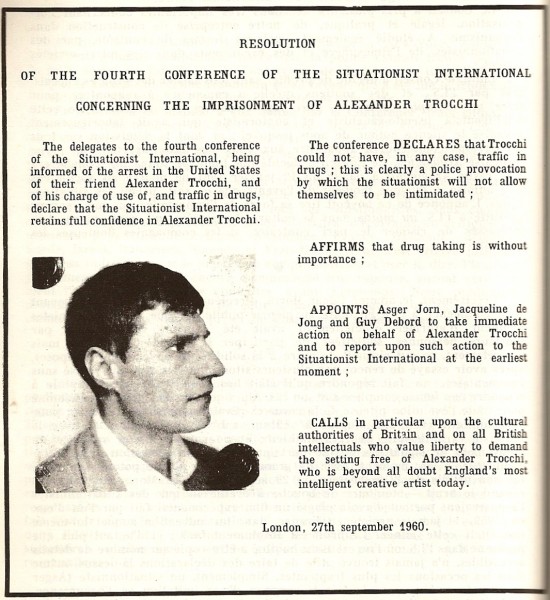Alexander Trocchi
By:
July 30, 2010

ALEXANDER TROCCHI (1925-84) was a great writer and a cautionary tale. Very young he wrote a tough, dark modernist novella (Young Adam), then edited one of the major postwar lit mags (Merlin), then turned out a stack of pseudonymous porn quickies that are a hundred times more stylish and durable than most such efforts (see Helen and Desire in particular), then undertook to foment revolution, first as a member of the Situationist International and then spearheading his own Sigma, which promised not coup d’état but coup du monde. Along the way, however, he found junk, or it found him. His last great work, Cain’s Book, conveyed the experience in a visceral way that even Burroughs couldn’t rival; the mimesis extended to the conditions of its writing: he was paid by the page, upon delivery, so that every ten pages or so he could go cop. Afterwards all was ruin. He never finished anything again; he caused misery to his loved ones — his wife supported their habits by prostituting herself; he shot up in front of the kids. He ended his days selling used books, a junkie to the last. Then his ashes vanished and his papers mysteriously burned. He was Ozymandias, one whose name was writ on water.
ALSO BORN THIS DATE: Thorstein Veblen.
***
Each day, HILOBROW pays tribute to one of our favorite high-, low-, no-, or hilobrow heroes on that person’s birthday.
HILO HERO ITEMS by Luc Sante: Dashiell Hammett | Pancho Villa | James M. Cain | Georges Bataille | Félix Fénéon | Émile Henry | A.J. Liebling | Jim Thompson | Joe Hill | Nestor Makhno | Hans Magnus Enzensberger | Captain Beefheart | William Burroughs | Ring Lardner | Lee “Scratch” Perry | Serge Gainsbourg | Kathy Acker | Arthur Cravan | Weegee | Alexander Trocchi | Ronnie Biggs | George Ade | Georges Darien | Zo d’Axa | Petrus Borel | Blaise Cendrars | Alexandre Jacob | Constance Rourke | Damia | J-P Manchette | Jean-Paul Clebert | Pierre Mac Orlan | Comte De Lautreamont | André Breton | Robert Desnos | Arthur Rimbaud |
READ MORE about members of the Postmodernist generation (1924-33).
READ MORE HiLo Hero shout-outs.
SUBSCRIBE to HiLo Hero updates via Facebook.
SHARE this post, by clicking on the toolbar below.
